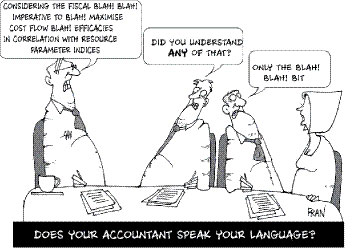3.3.3 Jargon
Every profession has its own terminology, but it is only meant to be used with people who are able to understand it. The use of jargon can be frustrating for those on the outside. Yet, the impulse to have an in-group way of communicating is obviously a strong one, which is why business jargon is always being developed and copied, despite being mocked or despised.
Activity 24
In this activity you consider some examples of twenty-first-century ‘business-speak’.
1 The following expressions are often used in the world of commerce and finance. Match the terms to their definitions.
Using the following two lists, match each numbered item with the correct letter.
Test it
The value of something that will be lost by taking an alternative action
In future
Look in detail
Gradually reduce the cost of an asset in the company’s accounts
The point at which sales equals costs
Measure of number of people who visit a venue or retail outlet
Clearly a good idea
Talk about something in private
A cut in the market value of an asset, usually enforced by an external authority
a.Haircut
b.Amortise
c.Opportunity cost
d.Drill down
e.Footfall
f.Take this offline
g.Break even
h.Going forward
i.No-brainer
j.Run this up the flagpole
- 1 = j
- 2 = c
- 3 = h
- 4 = d
- 5 = b
- 6 = g
- 7 = e
- 8 = i
- 9 = f
- 10 = a
2 Which of these terms would you regard as legitimate business vocabulary and which do you think are unnecessary jargon? What is your rationale for deciding which are legitimate and which are unnecessary?
Answer
There is no correct answer to these questions: one person’s jargon is another’s useful specialised vocabulary. However, it is true to say that many people get irritated by business-speak phrases such as ‘going forward’ and ‘drill down’ because they do not add any meaning to their ‘everyday’ alternatives. On the other hand, take ‘amortise’ or ‘break even’; each succinctly expresses a precise meaning that takes a number of words to convey in non-specialist language and so might more easily be regarded as legitimate. Nevertheless, despite the annoyance that some language can cause, it is worth remembering that people have a natural tendency to create ‘insider’ terms when they come together with members of their family, social group or fellow professionals. This is a means of conveying membership of a particular network of people and, thus, takes us back to the important role of language in the projection of identity.

